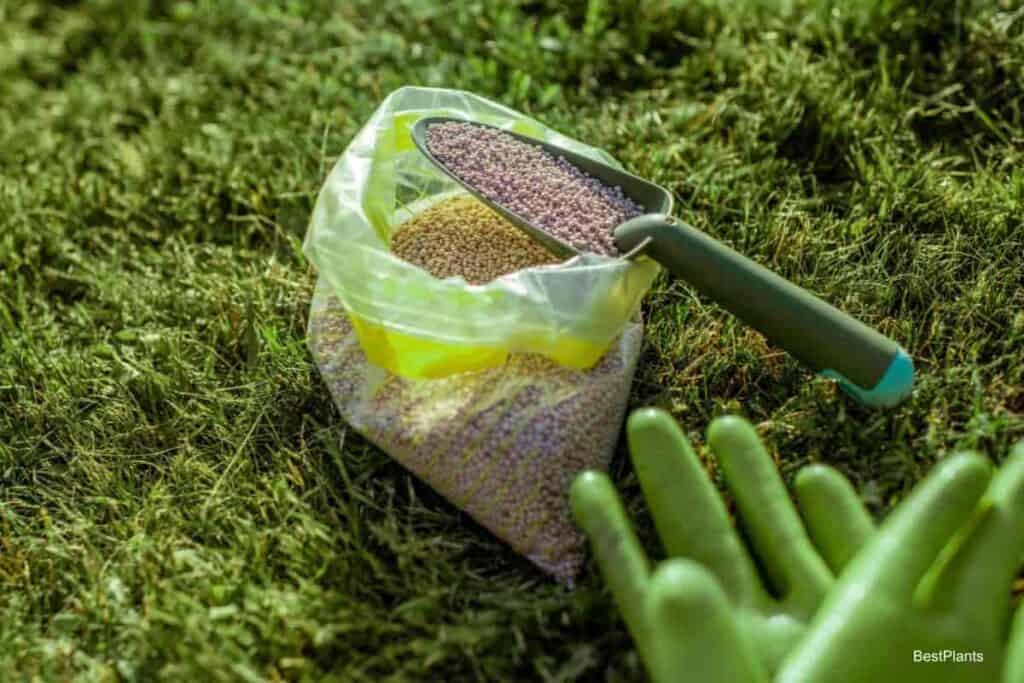Fertilizer alone does not directly kill weeds. However, it does contribute to circumstances that discourage weeds from growing.
For example, weeds tend to like poor, bare soil. A well-fertilized lawn has nutrient-rich soil and a thick cover of grass.

Both of these circumstances discourage weed growth.
In this article, we answer seven frequently asked questions about lawn fertilizer in weed control.
Read on to learn more.
7 Common Questions About Lawn Fertilizer & Weeds
1. Does Lawn Fertilizer Feed Weeds?
While it’s conceivable that lawn fertilizer could supply weeds with nutrition, it’s important to understand that, just as with any plant, the entire culture matters to growing weeds.
Typically, weeds thrive in poorer soil with lots of sun exposure, so fertilizer encourages healthy soil, and thick grass works against weeds, not for them.
2. Is It A Good Idea To Use A Weed And Feed Product?
Fertilizers that also deliver herbicide can be very convenient.
However, unless you have a reasonably overwhelming weed problem, broadcasting herbicide over your entire lawn is probably not necessary and may even damage your grass and the environment.
Feeding and weeding are two separate lawn care maintenance tasks, and doing them separately will likely yield better results.
3. How Can Weed And Feed Products Damage Your Grass?
Using too much product at one time, or applying the product several times a year can cause fertilizer burn.
4. Why Would A Weed And Feed Product Damage The Environment?
Herbicides can be controlled and kept out of underground water tables when used sparingly and carefully.
However, suppose you routinely apply herbicide all over your yard.
In that case, a great deal of it is very likely to run off into local waterways and eventually wind up in drinking water.
Herbicides in the water system cause many problems, such as:
- Algal bloom
- Injury
- Death to aquatic life.
5. Should You Rely On Fertilizer To Control Weeds In Your Lawn?
Fertilizing is part of a comprehensive weed control program.
Keeping your lawn in good condition and well-nourished will indirectly reduce your weed problems.
You’ll still need to use other weed control measures, at least occasionally.
6. What Other Steps Should You Take To Control Lawn Weeds?
Establishing a regular lawn care routine can go far to discourage and eliminate weeds in your lawn. Be sure to:
- Mow regularly and at the proper height.
- Apply a pre-emergent weed killer (if you need to) late in the autumn.
- Apply a layer of organic compost late in the autumn to nourish your grass and thick cover to discourage weed growth in the winter.
- Aerate your lawn early in the springtime.
- Apply the right fertilizer for your grass early in the springtime.
- Pull weeds when you see them.
- Use non-selective foliar herbicides, such as roundup, in a focused way to eradicate individual weeds or small patches of weeds in your lawn.
TIP: You can apply fertilizer and aerate your lawn simultaneously by wearing golf shoes when you push your fertilizer spreader over the grass.
7. How Many Times A Year Should You Fertilize Your Lawn?
It’s a good idea to fertilize seasonally to help your lawn stay thick and lush.
Strong, healthy grass naturally resists weed invasion. [source]
